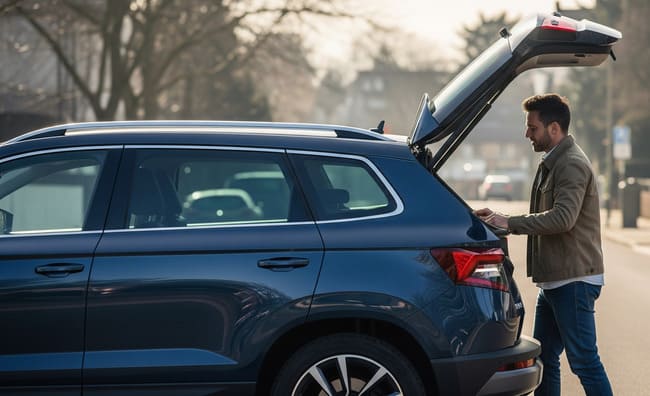Problems with the Škoda Karoq

Reliability Škoda Karoq: common problems, issues symptoms and faults
- DSG transmission shifting problems: The DSG automatic transmission, especially in the 1.5 TSI and 2.0 TSI variants, exhibits shifting problems as early as 30,000–50,000 km. The transmission does not shift smoothly or does not jump into the desired gear, resulting in jerky movements.
- Electric tailgate malfunctions: The electric tailgate no longer opens reliably, especially in colder temperatures. These malfunctions often occur after 40,000–60,000 km and affect both the sensor function and the mechanical components.
- Start-stop system failures: The start-stop system no longer functions properly, especially in the 1.0 TSI and 1.6 TDI engines. Symptoms become apparent after just 20,000–35,000 km, with erratic shutdown or starting problems.
- Central locking malfunctions: The central locking system no longer works properly, often accompanied by the error message "Key not recognized." These problems typically manifest after 25,000–45,000 km of mileage.

Škoda Karoq: Problems with the DSG automatic transmission
The DSG transmission in the Škoda Karoq exhibits various weak points, manifesting as jerky gearshifts, delayed responses, and unusual noises. The 1.5 TSI DSG and 2.0 TSI Sportline 4x4 DSG variants are particularly affected, with the automatic transmission showing initial symptoms as early as 30,000 km. The problems often worsen in stop-and-go traffic and can lead to a complete failure of the gearshift function. The 2.0 TSI Sportline 4x4 DSG version also suffers from problems with the all-wheel drive coupling, which can negatively impact handling.
Systematic inspection is essential for the longevity of the transmission. The sensitive Škoda Karoq DSG control units require regular software updates and special transmission oil changes every 60,000 km. The reliability of the DSG system can be significantly improved through preventative maintenance and the use of original transmission oil, thus avoiding expensive repairs.

Škoda Karoq: Problems with the electric tailgate

The Škoda Karoq's electric tailgate is experiencing various malfunctions, ranging from complete failure to intermittent problems. The electric tailgate no longer opens reliably, especially at temperatures below 5°C, which indicates faulty sensors or motor problems. The trunk also no longer opens at the push of a button if the control unit or wiring is damaged. These malfunctions occur more frequently after 40,000-60,000 km and can be caused by moisture or mechanical wear.
Regular maintenance is crucial for the proper functioning of the tailgate. The complex Škoda Karoq tailgate mechanisms require inspection of the sensors, hinges, and electrical connections every 30,000 km. Professional maintenance of the seals and regular cleaning of the contacts can prevent many problems and extend the life of the system.

Škoda Karoq: Problems with the start-stop system
The Škoda Karoq's start-stop system frequently exhibits malfunctions, manifesting as unreliable engine shutdowns or starting problems. The 1.0 TSI and 1.6 TDI engines are particularly affected, with the start-stop system no longer functioning properly after just 20,000–35,000 km. Symptoms include the engine not starting after stopping, irregular shutdown while idling, or complete failure of the system. The 2.0 TDI 4x4 variant may also experience battery capacity issues that affect the system.
A professional inspection is required for the system's proper functioning. The sensitive Škoda Karoq start-stop components require special AGM batteries and regular sensor checks every 25,000 km. Preventative maintenance of the battery and electronic control units can significantly improve the system's reliability and avoid costly repairs.

Škoda Karoq: Problems with central locking and key recognition
The central locking system in the Škoda Karoq is experiencing various malfunctions, manifesting as the error message "Key not recognized" or the complete failure of the remote control. The central locking system is no longer working reliably, especially in models with the Comfort Access system, where sensors and antennas can fail after 25,000–45,000 km. Additional problems arise when the fuel cap doesn't open or other electrical locking systems fail. These errors can be caused by both defective key batteries and problems with the vehicle's electronics.
Professional maintenance is essential for vehicle safety. The complex Škoda Karoq central locking systems require regular inspection of antennas, sensors, and control units every 30,000 km. Systematic diagnostics can help distinguish between key problems and vehicle defects, thus avoiding unnecessary repair costs.

Škoda Karoq: Problems with the air conditioning and cruise control

The Škoda Karoq's air conditioning system exhibits various malfunctions, ranging from reduced cooling performance to complete failure. The air conditioning system no longer functions properly, especially with automatic climate control systems, where sensors and actuators can fail after 35,000–55,000 km. At the same time, problems occur with the cruise control – it no longer works properly or shuts off accidentally. In some models, inductive charging also no longer works, which indicates electrical faults in the interior. These combined defects often indicate problems with the central vehicle electronics.
Systematic inspection is required for optimal function of all comfort systems. The connected Škoda Karoq air conditioning control units require regular software updates and sensor calibration every 40,000 km. Preventative maintenance of the electrical systems and regular cleaning of the air conditioning system can significantly extend their service life and prevent expensive repairs.

Škoda Karoq: Problems with the diesel engines
The diesel engines in the Škoda Karoq, especially the 2.0 TDI and 1.6 TDI, exhibit specific weaknesses that manifest themselves in power loss and increased emissions. The 2.0 TDI 190 hp diesel engine no longer runs optimally and exhibits problems with the particulate filter or exhaust gas recirculation after just 50,000–70,000 km. The 2.0 TDI 4x4 variant can also experience turbocharger issues, leading to significant power loss. The 1.6 TDI engine is particularly susceptible to injector problems, which manifest themselves in rough idle and increased fuel consumption.
Regular maintenance is crucial for the longevity of diesel engines. The sophisticated Škoda Karoq TDI injection systems require professional cleaning and inspection of the exhaust system every 30,000 km. Preventative treatment with diesel additives and regular long-distance driving can prevent many typical diesel problems and ensure engine reliability.

Additional common defects of the Škoda Karoq
Based on the experience of Škoda Karoq owners, the following additional problems occur:
- Defective rear view camera: Image distortion or complete failure after 45,000-65,000 km, often caused by moisture or cable breakage.
- Problems with the seat heating: Uneven heating or total failure after 35,000-50,000 km, often due to defective heating elements.
- Bluetooth connection problems: Intermittent connection drops to the smartphone after 25,000-40,000 km, often due to software conflicts.
- Defective exterior mirror adjustment: Electric mirror adjustment no longer works after 55,000-75,000 km, usually due to engine wear.
- Problems with the immobilizer: Vehicle does not start despite the correct key after 30,000-45,000 km, often due to a defective antenna.
- Steering wheel heating failures: Stops working or gets too hot after 40,000-60,000 km, typically due to heating coil defects.
- Panoramic roof leaks: Water ingress during heavy rain after 50,000-70,000 km, usually due to defective seals.
- USB charging port problems: Charging no longer works or only works intermittently after 20,000-35,000 km, often due to contact corrosion.

Škoda Karoq: Weaknesses and strengths
| Strengths |
Weak points |
| Spacious interior |
DSG transmission shifting problems |
| Good workmanship |
Electric tailgate failures |
| Modern assistance systems |
Start-stop system malfunctions |
| Attractive design |
Central locking defects |
| Versatile engine range |
Air conditioning malfunctions |
| Good value for money |
Diesel engine problems |
| High safety rating |
Electronic malfunctions |
| Practical room layout |
Cruise control failures |
The Škoda Karoq presents itself as a fundamentally solid and well-designed SUV, but it does suffer from some teething issues typical of modern vehicles. Most problems center on the complex electronics and DSG transmission, while the basic mechanics and bodywork are considered reliable. Regular maintenance according to manufacturer specifications and the timely repair of minor defects can significantly improve the vehicle's longevity and avoid major repair costs.
























